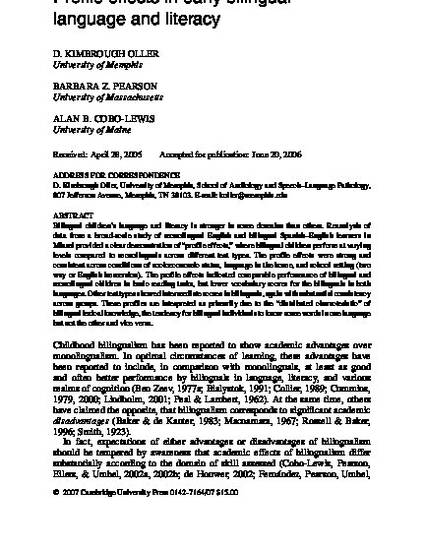
Article
Profile Effects in Early Bilingual Language and Literacy
Applied Psycholinguistics
Document Type
Article
Publication Date
4-1-2007
Disciplines
Abstract/ Summary
Bilingual children's language and literacy is stronger in some domains than others. Reanalysis of data from a broad-scale study of monolingual English and bilingual Spanish-English learners in Miami provided a clear demonstration of "profile effects," where bilingual children perform at varying levels compared to monolinguals across different test types. The profile effects were strong and consistent across conditions of socioeconomic status, language in the home, and school setting (two way or English immersion). The profile effects indicated comparable performance of bilingual and monolingual children in basic reading tasks, but lower vocabulary scores for the bilinguals in both languages. Other test types showed intermediate scores in bilinguals, again with substantial consistency across groups. These profiles are interpreted as primarily due to the "distributed characteristic" of bilingual lexical knowledge, the tendency for bilingual individuals to know some words in one language but not the other and vice versa.
Citation/Publisher Attribution
Oller, D.K., Pearson, B.Z, & Cobo-Lewis, A.B. (2007). Profile Effects in Early Bilingual Language and Literacy. Applied Psycholinguistics, 28, 191-230. Available on publisher's site at http://journals.cambridge.org/abstract_S0142716407070117
Publisher Statement
Copyright 2007 Cambridge University Press
DOI
10.1017/S0142716407070117
Version
publisher's version of the published document
Citation Information
D. Kimbrough Oller, Alan Cobo-Lewis and Barbara Z. Pearson. "Profile Effects in Early Bilingual Language and Literacy" Applied Psycholinguistics Vol. 28 Iss. 2 (2007) p. 191 - 230 Available at: http://works.bepress.com/barbara_pearson/5/
